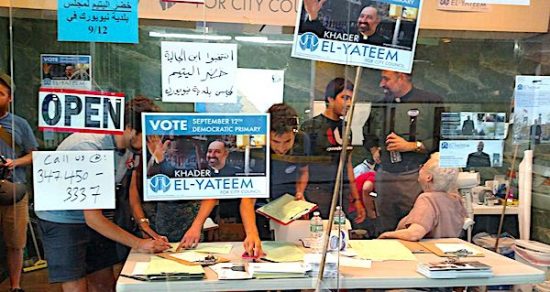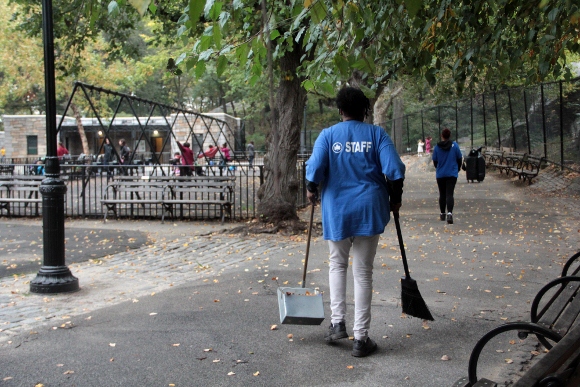How we remember, teach, learn from, and historicize the reverberations from September 11

November 5, 2021
In September of this year, to coincide with the 20th anniversary of September 11, The Margins began publishing essays, interviews, and oral history as part of our notebook Living in Echo.
The title of this notebook refers to the echo of the September 11 attacks, of the U.S. Global War on Terror and its fallout domestically, and it is drawn from the title of the final section of the Asian American Literary Review’s Fall 2011 issue, coedited by Rajini Srikanth and Parag Khandhar: “We Live in Echo.”
In her introduction to that issue, Srikanth writes of their intention to fill in the gaps of official acts of mourning ten years after 9/11:
“We must weave in the devastations and deep wounds of individuals and communities caught in the dragnet of state power, held in detention centers without cause, tortured, humiliated, stripped of their dignity as humans, severed from their families, deported, de-humanized, and victimized by the United States’ Global War on Terror.”
The testimony, dialogue, essays, and art AALR published brought alive the struggles and resistance of Muslim, SWANA, and South Asian communities in the days, months, and years after September 11.
Twenty years after 9/11, Living in Echo grasps at that reservoir of community memory and draws it further into our present. The work we have published over the past several weeks revolves around how we remember, teach, learn from, and historicize the reverberations from September 11. And just as we look back, our writers chart new questions for Asian American politics and literature.
As part of this collection, we asked several writers to revisit the pieces they wrote for AALR in 2011 and to write into the space of the past ten years.
Rajini Srikanth and Parag Khandhar, coeditors of AALR’s 9/11 commemorative issue from 2011, joined in conversation to reflect on the importance of collectively documenting Asian American history.
With both rage and sorrow, Samina Najmi writes about the violence streaked across the past 20 years.
Zohra Saed brings alive the desperate attempts of Afghans in the diaspora trying to coordinate evacuations in the days and weeks after the U.S. withdrawal from Afghanistan and the Taliban takeover.
Sham-e-Ali Nayeem shares a poem that is both a form of counsel and restless recognition: “When the sky is falling / you must learn to / generate a force field.”
In a call to action, Deepa Iyer declares that “alliance building is no longer a question of choice or an option to exercise…[but] an imperative.”
Jennifer Hayashida makes the case for the importance of literary translation in Asian American studies, “so that the echoes of forced displacement are made visible across and between histories, nation-states, and languages.”
Inspired by the shapes of collective writing and community documentation we read in AALR’s 2011 issue, we published works that drew in multiple voices, whether through oral history or conversation.
Open City Fellow Lylla Younes seamlessly braids deeply felt and heart-rending oral histories from four women who spent years supporting Arab and Muslim communities on the ground in New York City after 9/11.
In a photo essay, Sunaina Maira, Madihah Akhter, and Sabiha Basrai chart a Bay Area–focused history of post-9/11 organizing among South Asians.
Five NYC educators—Kyung Cho, Victoria Meng, Sophie Oberfield, Annie Thoms, and Shreya Vora—talk about teaching Asian American literature post-9/11 and how to build solidarity and trust in the classroom while talking about the “big, difficult things.” Drawn from their conversation, we collected a list of recommendations, from novels and plays to individuals poems and scholarly works.
Many of the pieces published as part of this notebook are accompanied by artwork adapted from Tomie Arai’s The Shape of Me (2011), a silkscreen banner “composed of dozens of images of Afghan men, women and children superimposed over images from the Vietnam War.” Arai created the work in response to a national call to artists issued by the American Friends Service Committee for the 2011 exhibition entitled Windows and Mirrors: Reflections on the War in Afghanistan. The Shape of Me also appeared in the Fall 2011 issue of the Asian American Literary Review.
“Commemorations cannot be static affairs,” Rajini writes later in her introduction to the Fall 2011 Asian American Literary Review issue. Our hope is to continue unsettling the ground with this work, and to set the AALR issue into motion.
Download the Fall 2011 issue of the Asian American Literary Review here as a free PDF.



